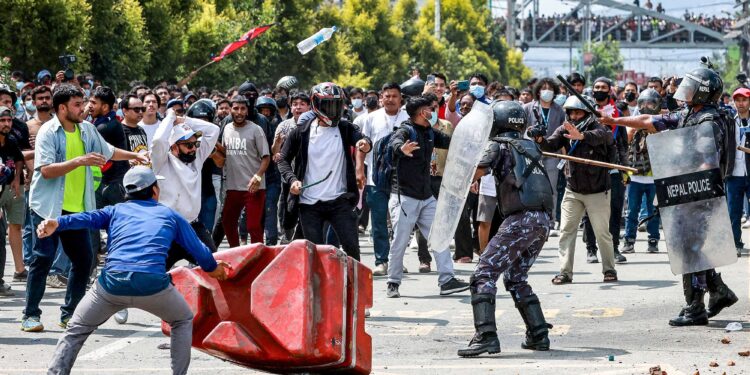Mass demonstrations in Nepal’s capital turned deadly on Monday when police opened fire on crowds protesting a government ban on social media, leaving at least 10 people dead and dozens more injured.
The unrest erupted after authorities blocked access to platforms such as Facebook, YouTube, and X, citing failure by the companies to officially register and comply with local oversight rules. Tens of thousands of people, many of them young Nepalis, filled the streets of Kathmandu to denounce the restrictions, which they argued were aimed at silencing criticism of the government.
Protesters pushed through barbed wire and forced riot police to retreat as they surrounded parliament. Officers initially used tear gas and water cannons to hold back the crowds but, overwhelmed by the numbers, eventually retreated into the parliamentary compound before opening fire.
Hospitals across the city reported an influx of casualties. Doctors at Bir Hospital confirmed six deaths, while Civil Hospital and KMC Hospital each reported two more. Medical staff at other facilities, speaking anonymously, said they were treating dozens of wounded protesters.
The situation prompted officials to impose a curfew around parliament, the presidential residence, and several key government areas. Demonstrators waving Nepal’s red-and-blue national flag chanted slogans such as, “Stop the ban on social media, stop corruption not social media.” Organizers dubbed the mass action a “Gen Z protest,” in reference to the younger generation most reliant on online platforms for communication and activism.
Officials defended the ban, pointing out that TikTok, Viber, and a handful of other platforms had registered and remained operational. They argued the move was necessary until more platforms agreed to comply with proposed legislation requiring companies to set up a local office and be held “responsible and accountable” under Nepalese law.
Rights groups have condemned the measure as a thinly veiled attempt at censorship, warning that it undermines freedom of expression and risks further unrest. Critics say the bill before parliament is designed less to regulate online platforms and more to stifle dissent by punishing political opponents active on social media.
Nepal has a recent history of conflict over digital freedoms. In 2023, the government banned TikTok, citing threats to “social harmony,” before lifting the ban last year after the company pledged to follow local rules. That came on top of an earlier 2018 ban on pornographic websites.
Monday’s violence marks one of the bloodiest crackdowns in Kathmandu in recent years and underscores the volatile intersection of technology, politics, and civic freedoms in the Himalayan nation.







